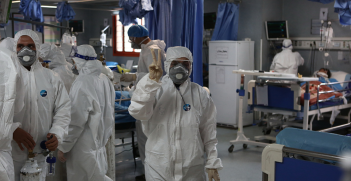Turning Adversity Into Advantage: How Organised Crime is Responding to COVID-19

Widespread lockdowns have disrupted business models and increased chance arrests. Government responses to COVID-19 are affecting organised crime as much as anyone else.
Despite its obviously secretive nature, Washington-based think tank Global Financial Integrity estimates organised crime groups (OCGs) make between US$1.6 trillion and $2.2 trillion annually. Counterfeiting is the most profitable, with earnings between $923 billion and $1.13 trillion, followed by drug trafficking, which makes between $426 billion and $652 billion. For comparison, according to World Bank data, if OCG profits were a country, its GDP would be in the top 10 in the world, well outstripping Australia’s 2017 GDP of US$1.33 trillion. In other words: organised crime is big business.
With money comes power, and with a history of interfering in elections and even waging wars, OCGs have shown they are not afraid to use it. According to Interpol, these “criminal enterprises closely resemble those of legitimate international businesses. They have operating models, long-term strategies, hierarchies, and even strategic alliances, all serving the same purpose: to generate the most profits with the least amount of risk.” And like nearly all legitimate businesses, OCGs have been hard hit by the various disruptions caused by government responses to contain the coronavirus outbreak.
Traditional OCG activities such as illegal gambling have evaporated now there are no sporting events to bet on. Even the “world’s oldest profession” is suffering, with prostitutes banned from soliciting on the streets, authorities cracking down on businesses violating coronavirus lockdowns, and clients engaging in social isolation. In a more direct disruption of OCG, Italy’s isolation laws have even led to a fugitive mafia boss being caught and arrested.
“Non-essential” businesses shutting down are battering income derived not only from extortion and protection rackets, but also from “legitimate” front companies, usually used to launder illegal profits and diversify income streams. The shutdown has disrupted legal and illegal supply chains and affected manufacturing around the world. Heavily restricted and closed borders have made logistics and transportation more problematic. Aircraft, ships, and trucks that are used for transporting illegal goods are more likely to stand out now there is less general traffic to hide amongst. And when goods do reach their destinations, there are fewer people to unload and distribute them. All of this has made it harder to source ingredients and equipment needed to manufacture drugs. For example, Mexico’s cartels are finding it difficult to manufacture methamphetamines and fentanyl as it is much harder to import the precursor chemicals from China.
People smuggling has dried up not only due to the aforementioned border control measures, but also because OCGs themselves are wary of bringing impoverished outsiders from states with poor healthcare systems and sanitation practises into contact with their own communities and potentially spreading the coronavirus.
Demand for some drug types, particularly “party drugs” has gone down, as recreational users are forced to stay in now that bars and nightclubs are closed. Chronic drug users, those with serious substance abuse issues, are immunocompromised and are more likely to fall victim to coronavirus. All of these complications are making it more difficult to obtain counterfeit products and traffic drugs, increasing prices at a time when disposable income around the world is decreasing, leading to stagflation in the black market.
However, victory comes from finding opportunities in problems. Like legitimate business enterprises, OCGs that don’t adapt to changing environments will not survive. And there are opportunities to be found in the post coronavirus world, particularly in the provision of products which have suddenly become very desirable and in providing services which are difficult or impossible to obtain. Britain’s National Crime Agency is warning that there has been an increase in online-based crime, such as coronavirus-themed malicious apps and websites and email phishing attacks aimed at stealing data. Another concern is that with schools now closed around the world, children are spending more time online, increasing grooming and exploiting opportunities.
Meanwhile, as shops empty and as states bar people from accessing items, people will turn to the black market or dark web to meet their needs. The head of Interpol has warned that OCGs are engaging in financial fraud and exploiting the demand for coronavirus-related goods, such as face masks, hand sanitisers, and test kits by selling counterfeit test kits, substandard items, and even “cures.” In many cases people, are paying money and not receiving their orders.
Closed borders have traditionally led to the rise of people smuggling. With coronavirus and government responses creating more poverty and instability in the world, human traffickers, including sex traffickers, will have more vulnerable victims to prey on. In Colombia, smuggling is already well established, as it is the world’s biggest producer of cocaine. So now that President Duque has announced the closure of Colombia’s borders, those wanting to leave must engage with OCGs by paying bribes or getting more deeply involved in criminal activities by becoming mules.
In cases where the state cannot ensure security, OCGs are stepping into the void and providing “protection.” Gangs in Brazil’s favelas are taking advantage of President Bolsonaro’s dismissal of the disease by imposing lockdowns themselves. These slums, with their high-density populations and poor sanitation, are especially susceptible to the disease. Gangs in El Salvador are doing the same. These actions will generate social capital within the communities where these gangs operate so as to not disrupt their activities with increased police presence. Enforcing lockdowns also creates protection, extortion, and blackmail revenue streams. And it means the chances of gang members themselves contracting the disease decreases. Gang members may be low on the priority list if they fall ill and require medical attention.
OCGs are already planning for when the economy does pick up. Their diverse portfolios of front companies will be in demand. For example, the various Italian mafia clans have invested in the cleaning, waste management, recycling, logistics distribution, and funeral industries over the last few decades, all of which will be in demand when the post-coronavirus clean-up operations begin. OCG’s with investments in health-related businesses will be especially happy. And when legitimate small business owners require funds to get back on their feet, loan sharks will have victims to feast on.
Lastly, the pressures caused by the conditions of rising economic hardship and instability make it easier for OCGs to recruit members, as the wealth and lifestyle OCGs promise becomes increasingly attractive. Even legitimate businesses may turn a blind eye to illegal activity in exchange for bribes.
Like any good enterprise, OCG’s are agile. They can find opportunity in every black swan event. Giuseppe Governale, the head of Italy’s anti-mafia investigation directorate, put it best when he said the “mafia can turn threats into opportunities.”
Stjepan Bosnjak holds a Master of Arts (Research) from Victoria University.
This article is published under a Creative Commons Licence and may be republished with attribution.





